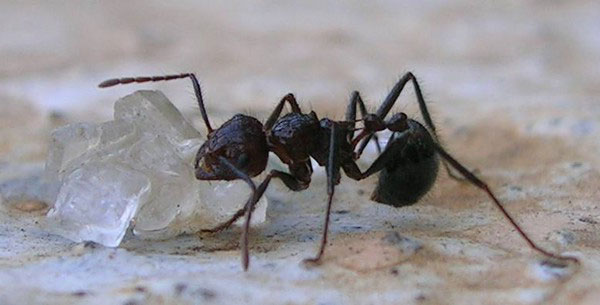Why Ants Herd Aphid “Cows”
By Chris Williams on May 17, 2013.

In the pest control business, we know that ants sometimes prefer sweet, sugary foods and sometimes they’d rather feed on protein-based, oily foods. Ants’ food preferences are often seasonal, and often related to development of the young in the colony. We often have to switch our baits until we figure out what the ants are feeding on this week. Almost every type of ant though will feed on “honeydew.”
Yummy! Aphid “Honeydew”
Honeydew has nothing to do with honeydew melons. It’s the name for a high sugar, energy-rich food substance that is excreted by aphids. By excreted, I mean that honeydew is squeezed out of their anus in the form of a sticky droplet. It’s not just aphids, other plant-sucking insects like mealybugs, whiteflies, and scale insects also produce honeydew. Honeydew is naturally sweet because these insects suck sugar-rich juices (basically nectar) from plants.
Some ants and aphids have a mutualistic relationship—the ants have become aphid farmers. The ants herd and actually “milk” their aphids by stroking them with their antennae to get them to release the coveted honeydew droplet. Some aphids have even lost the ability to poop on their own!
The ants protect their aphid “cows” from predators such as lady beetles. The aphids are happy to provide honeydew in exchange for the protection. Ant farmers will even move their aphids to new food sources to keep that honeydew coming. If the aphid cows develop wings, the ants will chew the wings off to keep their cows at home. Some aphids even spend the winter protected inside the ants’ colonies. The ants carry them back to their plant hosts in the spring.
Honeydew Affects You, Too
This mutually beneficial relationship may be good for the ants and the aphids, but it’s not so good for homeowners. When ants are farming aphids, populations of both tend to increase dramatically. Aphids are plant pests; plants infested with aphids can decline or even die as a result of their feeding. Honeydew also leaves sooty mold on leaves—a bane of gardeners. When ants are tending aphids on plants near a house, the ants may start to forage into the house as well, especially if their honeydew source declines.
This means that if you have a problem with ants in your home, those ants could be tracked to aphids on plants around your house. In some cases, an indoor ant problem can be controlled by simply controlling aphid or other plant-sucking insects on plants outside. Conversely, controlling ants may also control aphids on your plants as they will lose their protective benefactors.